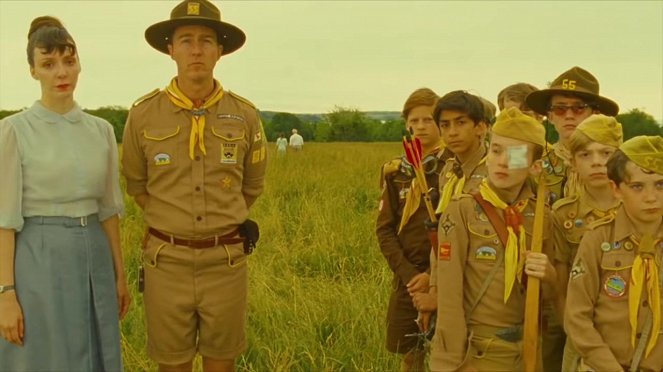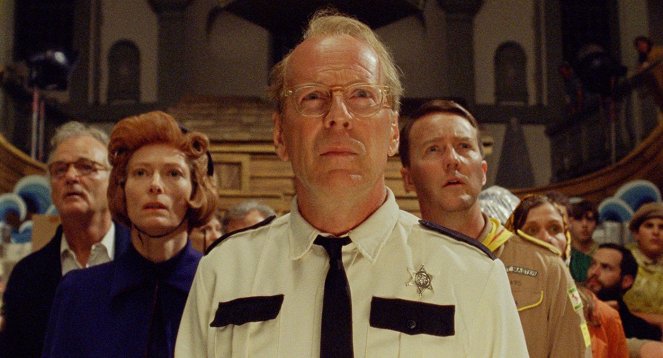Regie:
Wes AndersonKamera:
Robert D. YeomanMusik:
Alexandre DesplatBesetzung:
Bruce Willis, Edward Norton, Bill Murray, Kara Hayward, Jared Gilman, Jason Schwartzman, Tilda Swinton, Frances McDormand, Harvey Keitel, Bob Balaban (mehr)Inhalte(1)
Das Jahr 1965 im Sommer auf einer kleinen Insel vor Neuenglands Küste: Die Eheleute Bishop sind so sehr mit eigenen Problemen beschäftigt, dass es zuerst gar nicht merkt, dass sich Tochter Suzy heimlich davongestohlen hat. Mit ihrem Freund aus dem auf der anderen Seite der Insel gelegenen Pfadfinderlager will sie die Wildnis erkunden. Irgendwann beginnt dann doch die Suche nach den beiden Ausreißern. Der örtliche Sheriff und Liebhaber von Mrs. Bishop führt sie an... (Universal Pictures Germany)
(mehr)Videos (27)
Kritiken (12)
Eine eigenwillige Auffassung von einem Pfadfinderlager, und ich kann schon recht gut verstehen, warum überall geschrieben wird, dass die Filme von Wes Anderson vom Genre her nicht einzuordnen sind. Eine tolle Leistung des zentralen kindlichen Duos, meines Lieblings Norton und Willis in einer ungewöhnlichen Lage. Vielleicht kann ich mich irgendwann zu Die Tiefseetaucher aufraffen, wo ich irgendwann mal nach zehn Minuten schrecklicher Langeweile abgeschaltet habe.
()
Andersons Scout-Ausverkauf - gewollt, kopiert aus früheren Werken, untypischerweise nicht zu Ende gebracht (so viele rauschen da einfach nur vorbei) und geschichtsenerzählerisch ist´s mehr als anämisch. Die Poesie der ersten Liebe oder des Campens von Jungs würd´ ich noch hinnehmen, jedoch von Wes erwarte ich mehr als eine amüsante direkte Durchschaubarkeit, aus der vor allem gegen Ende in einen totaler Krampf wird.
()
Ich muss gestehen, dass ich von Wes Anderson bis heute nur Der fantastische Mr. Fox gesehen habe. Der hat aber damals nicht ganz zu meiner Laune gepasst. Seitdem wartet er auf eine zweite Chance. Nach Moonrise Kingdom wird er sie bestimmt bekommen. Ich werde mir bestimmt auch (endlich) Andersons ältere Filme anschauen, weil mich dieser völlig bezaubert hat, und zwar mit allem. Es ist ein origineller, witziger, süßer, kindlich erwachsener Film mit einer perfekten Besetzung. Das Drehbuch sowie die Regie sind toll und Desplats Musik großartig. Was will man mehr?
()
I have to say that this time the whole is less than the sum of its parts. In Moonrise Kingdom, Wes Anderson works everything (everything that the eye can see) to the tiniest detail, which is nice and I appreciate it, but the charm of the story gets drowned under all that heavy and refined splendour. Visually, it’s beautiful – it was a lot of fun to pour over each scene and notice how Anderson moves with the camera (the opening credits!) – but I never got into the story and it didn’t affect me at all on an emotional level. All of Anderson’s films are standoffish, but you can find in them places to feel sad or moved… but here I missed them. The same applies to his characters, they are all (very) weird, but this time I missed the vitality I felt in Mr. Fox, Zissou and others. In Moonrise Kingdom I only found that vitality in Bill Murray’s character (the night scene in the bed), who was given very little space. Immediately after watching it, an unenthusiastic 80%, but it needs to lager a couple of days.
()
At the idea level, Moonrise Kingdom is basically a live-action version of Fantastic Mr. Fox, but with greater interest in the juvenile protagonist, who in Anderson’s film is equal to the adult protagonists (which is nicely shown in the partner relationship between Captain Sharp and Sam). This time, the king of indie films expresses his reluctance to leave the realm of childhood and to give up the wilderness and his own nature in favour of civilisation with a strong tinge of nostalgia (which somewhat clashes with several unexpectedly grown-up scenes of youthful first love). Even his inimitable playfulness sometimes has to give way to it. The banality of some of the plot twists and character transformations, which is the result of having too many characters and the effort to appropriately reward each of them, contrasts with the incredible degree of care put into each shot. The jokes don’t scream for our attention and it perhaps isn’t even possible to catch all of them or, as the case may be, find them in the mise-en-scéne on the first viewing. Anderson is able to work with the setting with a similar imaginativeness and poetic sense of space as, for example, Jacques Tati. Unlike Tati, however, he works with smaller areas (the Bishops’ home gives the impression of a dollhouse thanks to its “fragmentation” into individual rooms) as well as panoramas of more expansive exterior spaces so that they seem very flat (perhaps like side-scrolling video games). My admiration for the meticulousness and imaginativeness with which the film was made (i.e., not made up) outweighed my enchantment this time, but even so, it is still a huge shift in my attitude, since a few years ago I ranked Anderson among the directors that I would never even remotely be friends with. 85%
()



Werbung